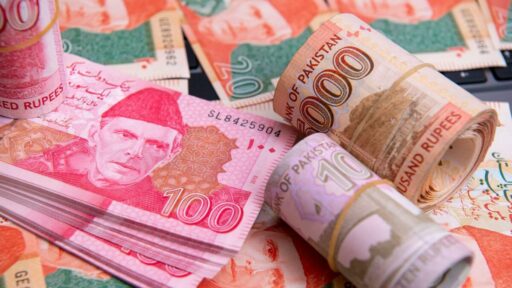Pakistan 10% Super Tax Explained
If you want to invest as an expat or high-net-worth individual, which is what i specialize in, you can email me (advice@adamfayed.com) or use WhatsApp (+44-7393-450-837).
Introduction
Pakistan’s government did not intend to revoke the 10% super tax imposed on the affluent in this fiscal year.
It has been revealed that there is presently no proposal to eliminate the 1% to 10% tax imposed on well-off individuals and companies.
This is according to the sources within the Federal Board of Revenue (FBR).
The Reforms and Revenue Mobilisation Commission (RRMC) has recommended:
— Incorporating the super tax into Section 147 of the Income Tax Ordinance.
— Collecting it in two advance installments from taxpayers.
To ensure equity between companies and associations of individuals, the RRMC has proposed a 10% tax.
This is imposed on associations of individuals and sole proprietors, excluding professional service providers.
The imposition of this “one-time super tax” ranging from 1% to 10% on large firms was announced by former Finance Minister Miftah Ismail.
Prime Minister Shehbaz Sharif also reiterated this commitment.
Nevertheless, it was reported that the government had no plans to fulfill this pledge.
According to Section 4C of the Income Tax Ordinance, the super tax will remain in effect for the tax year 2022 and beyond.
However, for the tax year 2022, individuals and companies in specific sectors faced a 10% tax rate if their income exceeds Rs300 million.
This included:
▪ Airlines
▪ Automobiles
▪ Beverages
▪ Cement
▪ Chemicals
▪ Cigarettes and tobacco
▪ Fertilizers
▪ Iron and steel
▪ LNG terminals
▪ Oil marketing
▪ Oil refining
▪ Petroleum and gas exploration and production
▪ Pharmaceuticals
▪ Sugar
▪ Textiles
The RRMC’s report acknowledges companies’ effective income tax rate is 51%.
This is higher than the standard income tax rate of 29% due to various tax types being included.
Nevertheless, the RRMC recommends the continuation of the Super Tax.
According to its interim report, taxpayers are not required to settle their tax liability in advance.
The RRMC proposed an amendment to section 147 of the Ordinance to make taxpayers responsible for paying advance tax.
This is against liabilities determined under the Super Tax and the deemed income tax on real estate.
The report also states that:
“If a taxpayer anticipates that their tax liability for 2023 is zero or less than their tax liability in 2022, they should file an estimate justifying the lower amount along with supporting evidence”.
Let us now have a look at some of the specific information related to the corporate tax scenario in Pakistan.
This will allow us to understand Pakistan’s super tax in a better way and how it would affect those liable for it.
Table of Contents
Corporate Residence
Let us start by understanding the tax residence status in Pakistan.
A company is considered a resident in Pakistan if:
— It is established or incorporated under Pakistani law
(Or)
— If its control and management are entirely located within Pakistan during that year.
The term ‘company’ includes:
⁃ A trust
⁃ A cooperative society
⁃ A finance society
⁃ Any other organization established under the law
⁃ A foreign corporate body incorporated outside Pakistan and any foreign association that the Federal Revenue authorities may designate as a company, whether incorporated or not.
Permanent Establishment (PE)
Following local tax laws, A PE is a place of business where a person conducts all or part of their business activities.
This includes:
— A place of management
— A branch
— An office
— A factory
— A workshop
— Premises for order solicitation
— Warehouse
— Permanent sales exhibition
— Sales outlet (excluding a liaison office unless it engages in contract negotiations other than purchase contracts).
— Sites for resource extraction such as mines, oil or gas wells, quarries, or any other natural resource extraction location.
— Agricultural, pastoral, or forestry properties.
— Virtual business presence in Pakistan with or without physical presence. This includes businesses conducting transactions over the Internet or any electronic medium.
— Building sites, construction, assembly, installation projects, or supervisory activities related to such projects. This applies only if they persist for over 90 days in any 12 months.
— Provision of services by any person through employees or other personnel, including entities engaged for this purpose. This includes consultancy services.
— A person acting in Pakistan on behalf of another person (the ‘agent’). This is unless the agent has independent status and acts in the ordinary course of business.
An agent is considered a PE if they have the authority to conclude contracts or habitually deliver goods on behalf of the other person.
Note: An agent of independent status acting in the ordinary course of business does not include a person acting exclusively or almost exclusively on behalf of the person they are associated with.
— Any substantial equipment, asset, or property capable of generating income.
— A fixed place of business used or maintained by a person if they or their associate conduct business at that place or another place in Pakistan, and:
That place or another place constitutes a PE of the person or an associate under this sub-clause.
The business conducted by the person or their associate at the same place or multiple places constitutes complementary functions as part of a ‘cohesive business operation.’
Note: It is clarified that a ‘cohesive business operation’ includes an overall arrangement for:
• The supply of goods
• Installation
• Construction
• Assembly
• Commission
• Guarantees
• Supervisory activities, with most or principal activities performed by the person or their associates.
The supply of goods refers to those imported in the name of the associate or another person, regardless of whether the title to the goods passes outside Pakistan.
In cases where Pakistan has a double tax treaty (DTT) with the country of origin of the PE, the definition of a PE provided in the DTT will take precedence.
Corporate Taxation
A company that resides in Pakistan is taxed on all the money it earns worldwide.
If a foreign company is working in Pakistan through a branch, it only gets taxed on the money it makes in Pakistan through that branch.
In the case of such a foreign company, the tax rate depends on what kind of company it is.
Here are the new tax rates for companies in Pakistan starting in 2023:
— Banking companies: 39%
— Public companies that aren’t banks: 29%
— Any other type of company: 29%
— Small companies: 20%
A “public company” can be:
— Listed on a stock exchange in Pakistan.
— One where the federal government or a public trust owns at least 50% of the shares.
Super Tax

In addition to what’s mentioned earlier, “super tax” is applied at different rates based on how much money you earn.
Here are those rates:
— If you earn over 150 million PKR but not more than 200 million PKR, you pay 1% super tax.
— If you earn over 200 million PKR but not more than 250 million PKR, you pay a 2% super tax.
— If you earn over 250 million PKR but not more than 300 million PKR, you pay a 3% super tax.
— If you earn over 300 million PKR but not more than 350 million PKR, you pay a 4% super tax.
— If you earn over 350 million PKR but not more than 400 million PKR, you pay a 6% super tax.
— If you earn over 400 million PKR but not more than 500 million PKR, you pay an 8% super tax.
— If you earn over 500 million PKR, you pay a 10% super tax.
Note: For banking companies with income over 300 million PKR, the super tax rate is fixed at 10% for the year 2023.
The government brought This super tax idea back in 2022, specifically for high-income earners.
They had different rates for different income levels, with the highest rate being 4%.
However, there was some controversy.
This is because some sectors had to pay a higher rate of 10% for that year, and banking companies would pay 10% in 2023.
Some people even filed legal petitions because they thought this was unfair.
Now, in 2023, they’ve set new rates for super tax, and everyone who earns more than 500 million PKR will pay the highest rate of 10%.
This change aims to get rid of the unfairness in the previous system.
Taxation of SMEs (Manufacturing Sector)
An SME, which stands for Small and Medium-sized Enterprise, is a business making things.
Its annual sales shouldn’t exceed 250 million PKR to be considered an SME.
But it’s not an SME for that year and beyond if it earns more.
To be recognized as an SME for tax purposes, you must:
— Register with the Federal Board of Revenue (FBR) on the IRIS website.
(or)
— Register with the Small and Medium Enterprises Development Authority (SMEDA) on its SME registration site.
Just so you know, if your company is seen as an SME, it can’t also be called a “small company.”
For tax calculations, SMEs are split into two groups, and the tax you pay is based on your income:
— If your yearly sales are 100 million PKR or less, you’ll pay 7.5% of your income in taxes (Category 1).
— If your yearly sales are more than 100 million PKR but don’t exceed 250 million PKR, your tax rate is 15% of your income (Category 2).
SMEs can also choose to be taxed under something called the final tax regime (FTR).
You have to decide this when you file your taxes, and once you pick it, you can’t change your mind for three years.
If you go for the FTR, you won’t have to deal with tax audits under certain sections.
Here are the tax rates under the FTR:
— If your yearly sales are 100 million PKR or less, you’ll pay 0.25% of your total sales (Category 1).
— If your yearly sales are more than 100 million PKR but don’t go over 250 million PKR, your tax rate is 0.5% of your total sales (Category 2).
And don’t worry, there’s no minimum tax on turnover for SMEs.
Taxation of a PE

Here are the rules for calculating taxable income for a Permanent Establishment (PE):
The PE is considered a separate entity and deals independently with non-residents.
You can deduct executive and administrative expenses, whether spent in Pakistan or elsewhere, in addition to business expenses.
You can deduct head office expenses like rent, salaries, travel, and other costs.
This is based on the PE’s turnover compared to the non-resident’s total head office expenses concerning their worldwide turnover.
When calculating the PE’s taxable income, you include:
⁃ Royalties
⁃ Fees for services (including management services)
⁃ Interest on loans (except for banking businesses) paid to or received from the PE’s head office.
You can’t deduct interest paid on loans taken by a non-resident to fund the PE’s operations or the insurance premium for those loans.
A ‘minimum tax’ is applicable if a PE or branch of a non-resident has done the following:
⁃ Income from selling goods in the same state
⁃ Providing services
⁃ Fulfilling contracts
This is based on a percentage of the total payment received, as follows:
⁃ For selling goods: 5%
⁃ For services: 9%
⁃ For contract work: 8%
Some specific services provided by a PE of a non-resident person have a reduced tax rate of 4%.
These services include things like:
⁃ Transportation
⁃ Hotel services
⁃ Software development and more
However, if you’re an inactive taxpayer, these rates are doubled.
A minimum turnover tax applies to PEs of non-residents at a rate of 1.25%.
In some instances or sectors, this turnover tax can be lower, ranging from 0.25% to 0.75% of turnover.
Specific contracts executed by Non-residents
Income earned by non-residents and related entities from turnkey contracts is considered income generated in Pakistan.
These can be a part of a larger arrangement involving:
• Supply of goods
• Installation
• Construction
• Assembly
• Commission
• Guarantees
• Supervisory activities, including offshore supply (all these activities forming a connected business operation).
This concept of “cohesive business operations” includes:
— An arrangement that covers the supply of goods, installation, construction, assembly, commission, guarantees, or supervisory tasks.
The person or their associates do most or all of these activities.
— The supply of goods, whether imported by the associate or any other person.
This is regardless of whether the ownership of the goods changes hands within or outside Pakistan.
The Commissioner (upon request by the payer) may allow a deduction of the tax equal to 20% of the regular tax amount, usually 7%.
This is when making payments for transactions that are part of such a cohesive business operation.
This results in an effective withholding rate of 1.4%.
For offshore supply contracts with an independent power producer (IPP), this rate is reduced to 1%.
This IPP should be located in Azad Jammu and Kashmir and meet specific conditions.
Associates
Two persons are considered associates when:
They have a relationship where:
— One is expected to act according to the intentions of the other (or) both are expected to follow a third person’s preferences.
— One person significantly influences the other, either alone or with associates.
The Decisions align with each other’s directions, instructions, or goals for common economic interests.
— A person engages in a transaction, directly or indirectly, with another resident in a jurisdiction with zero taxation.
Note – Being an employee of another person or both persons being employees of a third person does not automatically make them associates.
Certain relationships are treated as associates, including:
• Individuals
• Their relatives
• Members of an association of persons (under certain conditions)
• Trusts and beneficiaries of the trust
• Shareholders in a company and the company itself (under certain conditions)
• Two companies where an individual controls the other directly or indirectly (under specific conditions)
Two persons are not considered associates under specific clauses; if the Commissioner is satisfied, they wouldn’t reasonably follow each other’s intentions.
Minimum Tax on Turnover
When a company’s tax due is less than 1.25% of its total turnover, it must pay a minimum tax.
The minimum turnover tax equals 1.25% of its turnover unless it’s exempt from this rule.
In some cases, or for some industries, this turnover tax is lower than 1.25% (ranging from 0.25% to 0.75% of turnover).
If a company pays more tax than its regular tax obligation, it can carry forward the excess amount.
This excess amount can be applied to offset its tax liability for the next three years.
Transaction-based Minimum Taxes
Some withholding taxes (WHTs) are considered minimum taxes when calculating corporate tax on a net income basis.
Among some other types, these transactions include:
— The sale of goods (unless the company is a manufacturer or listed on a Pakistani stock exchange).
— Providing services (unless the payment is received by a company listed on a Pakistani stock exchange).
— Executing contracts (unless the payment is received by a company listed on a Pakistani stock exchange).
For commercial importers, advance income tax paid at the import stage is a minimum tax.
However, for industrial undertakings importing raw materials, it’s a tax that can be adjusted, with some exceptions.
Alternate Corporate Tax (ACT)
The Alternate Corporate Tax (ACT) system determines a company’s minimum tax liability as follows:
The higher of 17% of its accounting income or the corporate tax liability, as calculated under the law.
This includes the minimum tax on turnover.
This applies to most companies except for:
• Insurance companies
• Companies involved in the petroleum exploration and production sector
• Banks
• Companies with reduced tax rates
Certain types of income are not subject to the ACT, such as:
• Capital gains from specified listed securities
• Income eligible for a 100% tax credit due to equity investments
• Income earned by non-profit organizations
• Trusts
• Welfare institutions
Other Taxes
Corporate entities in Pakistan must also pay these taxes in addition to the corporate income tax and super tax.
⁃ VAT
⁃ Customs and import duties
⁃ Excise duty
⁃ Property taxes
⁃ Stamp duty
⁃ Social security contributions
Deductions

Depreciation:
Normal depreciation follows these rates using the reducing-balance method:
— Buildings: 10%
— Furniture (including fittings): 15%
— Machinery and plant, including vehicles and ships: 15%
— Computer hardware, including monitors and printers: 30%
— Aircraft and aero engines: 30%
— Ramps for people with disabilities (up to PKR 250,000): 100%
— Offshore platforms: 20%
New assets used for the first time in Pakistan (excluding certain cases) can claim an initial allowance of 25% of the asset’s cost.
Book depreciation doesn’t have to match tax depreciation.
Unused tax depreciation can be carried forward and used for up to three years.
However, only 50% of it can offset taxes in a year where taxable profits are PKR 10 million or more.
Amortization of intangibles:
Costs for patents, copyrights, software, and similar assets are deducted evenly over their useful life, up to 25 years.
Self-generated goodwill and certain accounting adjustments aren’t considered.
Organizational and start-up expenses:
Expenses before starting a business can be deducted over five years if they were incurred to generate taxable income.
Interest expense:
Interest can be deducted as an expense if the required withholding tax (WHT) has been removed and paid to the government.
Bad debt:
Bad debts can be deducted if they were previously included in taxable income, written off in financial statements, and are unlikely to be recovered.
Charitable contributions:
Fines and penalties:
Fines or penalties for violating laws, rules, or regulations are deductible.
Taxes:
Income taxes are not deductible. Sales and excise taxes can be deducted if the business pays them.
Otherwise, they’re passed on to consumers.
Other significant items:
Expenses for scientific research in Pakistan to generate taxable income are allowed.
Exchange gains and losses on foreign currency loans for asset acquisition are adjusted against the asset’s depreciable cost.
Lease rentals paid to certain institutions are deductible, but financial charges for these leases are not.
Deductions for lease rentals related to passenger vehicles not for hire are capped at PKR 2.5 million.
The cost limit is raised to PKR 7.5 million for depreciation.
If a business sells to unregistered buyers with sales over PKR 100 million per buyer, up to 10% of total deductions can be disallowed.
Businesses must comply with fiscal electronic devices and software requirements.
Non-compliance results in an 8% deduction inadmissibility and penalties.
Net operating losses:
Operating losses can be carried forward for six years.
Unabsorbed depreciation/amortization can be carried forward indefinitely, with some restrictions.
Payments to foreign affiliates:
The deductibility of a non-resident taxpayer’s head office expenditure is limited to the proportion of Pakistan’s turnover to total world turnover.
This rule changes if the branch is a tax resident of a country with a double taxation treaty that provides different rules.
Bottom Line
According to this circular, the Super Tax was introduced for high-income individuals through the Finance Act of 2022.
This tax uses a tiered rate system, starting at 1 percent and going up to 4 percent, for income ranges beginning at PKR 150 million and going up to PKR 300 million and beyond.
Specific business sectors faced a higher Super Tax rate of 10 percent if their income exceeded Rs. 300 million.
Additional income brackets were introduced to expand the coverage of the Super Tax and create a more progressive and consistent rate structure.
They have been introduced through the Finance Act of 2023.
These Super Tax rates, set at 6 percent, 8 percent, and 10 percent, will apply to all individuals starting from the tax year 2023.
However, for the tax year 2023, a banking company will be subject to a 10 percent Super Tax if its income, as defined under section 4C of the Ordinance, exceeds Rs. 300 million.
Additionally, there was confusion about how to pay the Super Tax.
This is regarding whether it should be paid as a lump sum when filing the income tax return or alongside monthly/quarterly advance tax installments under section 147 of the Ordinance.
This has been cleared in this article while explaining the Super Tax section.
I have covered the other important taxation details regarding corporate entities so they can have a broad understanding of the topic.
I also covered the deductions and corporate residence details so that you can have a grasp of this issue.
If you want to start a business in Pakistan or a branch of a foreign company in Pakistan, refer to these details thoroughly.
Having said that, I strongly hope that the information in this article was helpful to you.
If you are an expat or a high-net-worth individual looking for specialized investment services, feel free to contact me.

Adam is an internationally recognised author on financial matters, with over 760.2 million answer views on Quora.com, a widely sold book on Amazon, and a contributor on Forbes.



